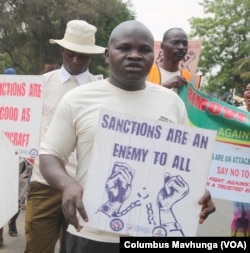Poor governance and corruption in Zimbabwe are responsible for the country’s economic decline, not U.S. and other Western sanctions imposed after reports of election rigging and human rights abuses, a top U.S. official said Wednesday. The country’s capital, Zimbabwe has scoffed at the claims, while some pro-government citizens protest the sanctions at the U.S. embassy in Harare.
James O’Brien, the U.S. State Department’s sanctions coordinator, told an online press briefing on October 19 that U.S. sanctions are not hurting Zimbabwe’s economy, as they do not affect banks, pointing to billions of dollars in reported annual illegitimate, illegal cross-border transactions as examples of what is hurting the country’s economy.
“Those cost the citizens of Zimbabwe a lot of their chance at having a more prosperous and free life. And so, we’d like our sanctions to be part of a policy answer that begins to improve the management of public services and public resources and makes things possible for the people of Zimbabwe to improve,” he said.
O’Brien said Washington is aware of concerns regional leaders have raised over the impact of the sanctions, including the Southern African Development Community and the African Union, saying that the impact of the sanctions is felt regionally and throughout the continent.
O’Brien said the U.S. would continue reviewing the sanctions list imposed in the early 2000s following reports of human rights abuses and election rigging by the current administration in Zimbabwe.
“We are not engaged in a comprehensive effort to close the Zimbabwean economy. We’re aware that because of the depth of the problems and the duration of this program, there probably are a lot of companies who believe that doing business in Zimbabwe is just too difficult. And that does cost opportunities for the people of Zimbabwe. Whether that’s the result of the underlying mismanagement and corruption, or whether our sanctions add to it. That’s something we are willing to talk about. We are focused on the people who benefit from corruption and human rights abuses in Zimbabwe. That’s the behavior we are attempting to change. Our sanctions are only one part of a policy to improve the situation there,” he said.
Some Zimbabweans disagree.
The chants are coming from pro-government members known as the Broad Alliance Against Sanctions. They are singing outside the U. S. embassy in Harare and ask, why do you hate Zimbabwe?
They have been camping here for months and continue to demand the removal of the sanctions.
Calvern Chitsunge, a member of the organization, told protesters and fellow government supporters the only thing we can do is demand that America remove sanctions it imposed on us today or yesterday.
He said as the Broad Alliance Against Sanctions, we sat down and agreed to write the Patriotic Act and we petitioned parliament. We appeared before the committee on foreign affairs and we said this law must prosecute those [Zimbabweans] who go abroad calling for sanctions, people who write lies. That’s what we are doing today: to correct mistakes made by the Americans and the British. Zimbabwe will never be a colony again. We are here to defend it, he said.
Zimbabwe officials refused to comment on O’Brien’s comments to journalists, saying President Emmerson Mnangagwa would address the nation Tuesday as the country marks what is known as “Anti-Sanctions Day,” when there will be government-organized protests in Harare.
Mnangagwa’s government called for the protests, alleging Zimbabwe is being punished for the land reform program under the late President Robert Mugabe in 2000, which forcefully displaced white commercial farmers and gave land to Black citizens.


